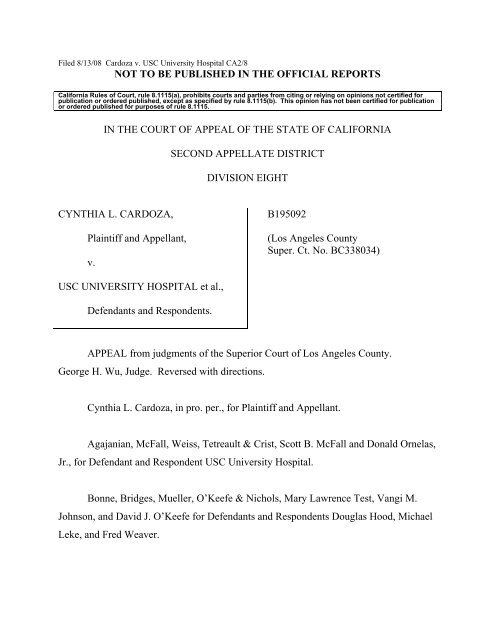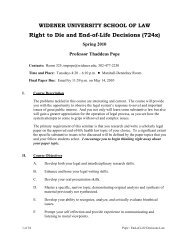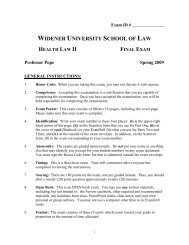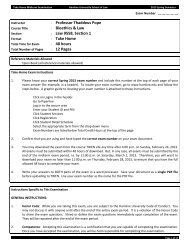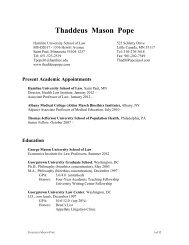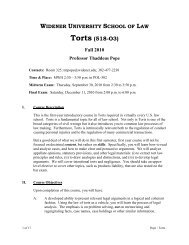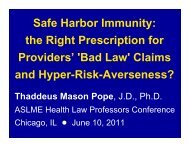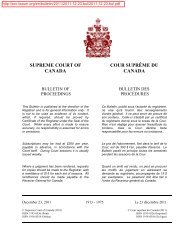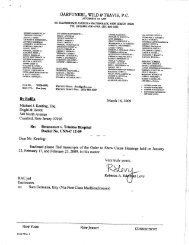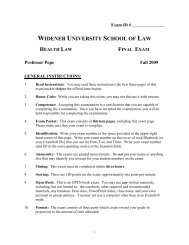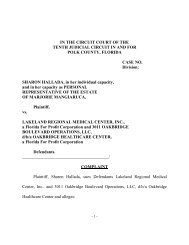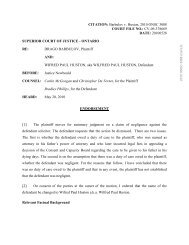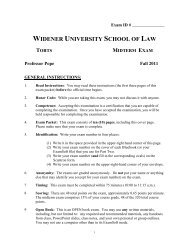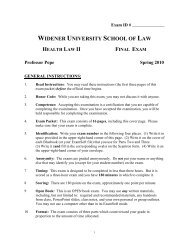Cardoza v. USC - Thaddeus Pope
Cardoza v. USC - Thaddeus Pope
Cardoza v. USC - Thaddeus Pope
Create successful ePaper yourself
Turn your PDF publications into a flip-book with our unique Google optimized e-Paper software.
Filed 8/13/08 <strong>Cardoza</strong> v. <strong>USC</strong> University Hospital CA2/8<br />
NOT TO BE PUBLISHED IN THE OFFICIAL REPORTS<br />
California Rules of Court, rule 8.1115(a), prohibits courts and parties from citing or relying on opinions not certified for<br />
publication or ordered published, except as specified by rule 8.1115(b). This opinion has not been certified for publication<br />
or ordered published for purposes of rule 8.1115.<br />
IN THE COURT OF APPEAL OF THE STATE OF CALIFORNIA<br />
SECOND APPELLATE DISTRICT<br />
DIVISION EIGHT<br />
CYNTHIA L. CARDOZA,<br />
Plaintiff and Appellant,<br />
v.<br />
B195092<br />
(Los Angeles County<br />
Super. Ct. No. BC338034)<br />
<strong>USC</strong> UNIVERSITY HOSPITAL et al.,<br />
Defendants and Respondents.<br />
APPEAL from judgments of the Superior Court of Los Angeles County.<br />
George H. Wu, Judge. Reversed with directions.<br />
Cynthia L. <strong>Cardoza</strong>, in pro. per., for Plaintiff and Appellant.<br />
Agajanian, McFall, Weiss, Tetreault & Crist, Scott B. McFall and Donald Ornelas,<br />
Jr., for Defendant and Respondent <strong>USC</strong> University Hospital.<br />
Bonne, Bridges, Mueller, O’Keefe & Nichols, Mary Lawrence Test, Vangi M.<br />
Johnson, and David J. O’Keefe for Defendants and Respondents Douglas Hood, Michael<br />
Leke, and Fred Weaver.
Plaintiff Cynthia L. <strong>Cardoza</strong>, in pro. per., appeals from judgments (orders of<br />
dismissal) entered in favor of defendants, <strong>USC</strong> University Hospital (hospital) and Drs.<br />
Douglas Hood, Michael Leke, and Fred Weaver (collectively physicians), after their<br />
demurrers to plaintiff’s third amended complaint, for fraud, were sustained without leave<br />
to amend. Because there is a reasonable possibility that plaintiff could amend to state a<br />
statutory claim under the Health Care Decisions Law (Prob. Code, § 4600 et seq.;<br />
decision law), we reverse the dismissals with directions to allow leave to amend.<br />
FACTS<br />
Plaintiff commenced this case on August 10, 2005, about one month less than<br />
three years after the September 17, 2002 death of her mother, Pascentia McDonald<br />
(McDonald), age 73, a patient at the hospital. The complaint alleged that the hospital,<br />
and the three attending physician defendants, had mistreated Ms. McDonald, first by<br />
injuring her peritoneum during thoracoabdominal aneurysm surgery on August 14, 2002,<br />
then by neglecting and concealing the prospect of infection – which eventually caused<br />
multiple organs to fail – and by performing numerous other surgeries, against the<br />
decedent’s prior directive. Plaintiff’s brother Bobby Miles, also named a defendant (but<br />
not a party to this appeal), wrongfully approved these surgeries as McDonald’s agent<br />
under an advance health care directive (AHCD) with power of attorney, in which plaintiff<br />
had been named alternative agent, should Miles be unable to act. As against respondents,<br />
plaintiff listed her causes of action as being for wrongful death, professional negligence,<br />
and elder abuse.<br />
The physicians demurred to each cause of action, for failure to state a claim and on<br />
the basis of applicable statutes of limitations, Code of Civil Procedure sections 331.5<br />
(personal injury/wrongful death, two years) and 340.5 (medical negligence, one year after<br />
discovery). (Undesignated section references are to the Code of Civil Procedure.) The<br />
hospital also demurred. 1 Plaintiff did not file opposition, and the court sustained the<br />
1<br />
We are unable to describe this or any others of the hospital’s pleadings, because<br />
neither plaintiff nor the hospital designated them for inclusion in the clerk’s transcript.<br />
2
demurrers with leave to amend. At the hearing, plaintiff stated that her grievance was<br />
infringement of her mother’s right to die with dignity and without suffering.<br />
In her first amended complaint (FAC), plaintiff elaborated on her mother’s course<br />
at the hospital, and plaintiff’s own interaction with the physicians and other hospital<br />
personnel. Plaintiff also attached as exhibits hospital records and other papers, including<br />
McDonald’s AHCD, which followed the form provided by Probate Code section 4701.<br />
Executed the day before McDonald’s initial surgery, the AHCD commenced with<br />
a health care power of attorney, by which McDonald appointed Miles her agent to make<br />
health care decisions for her (including to withdraw health care keeping her alive). His<br />
authority would be effective when McDonald became unable to make decisions on her<br />
own. Plaintiff was designated as alternate agent, should Miles be discharged or not be<br />
willing, able, or available to make a health care decision. As agent, Miles was to act in<br />
accordance with McDonald’s wishes as known to him, and also in accordance with her<br />
further instructions in the AHCD. Those instructions directed McDonald’s health care<br />
providers that she did not want her life prolonged should she have an incurable condition<br />
that would soon result in death, or if she was not expected to regain consciousness, or if<br />
the burdens of treatment would outweigh expected benefits. The instructions also<br />
rejected prolongation of a noncognitive existence, and made similar provisions. 2<br />
Plaintiff alleged that defendant Hood informed her on August 30, 2002, that her<br />
mother had an infection of toxic bacteria throughout her body. By that time, McDonald<br />
was in serious and painful condition. Plaintiff persuaded her to agree another exploratory<br />
surgery. McDonald thereafter underwent repeated surgeries, which she allegedly did not<br />
want, and became more debilitated, causing plaintiff suffering as well. 3 At some point<br />
2<br />
Attached to the AHCD was a declaration under the Natural Death Act, former<br />
Health & Safety Code section 7185 et seq., superseded in 2000 by the decision law. In<br />
this declaration, McDonald abjured life-prolonging treatment should she suffer an<br />
irreversible condition.<br />
3<br />
The post-infection surgeries were ostensibly performed in an attempt to isolate the<br />
source of the infection; but plaintiff suggested they were experimental.<br />
3
McDonald was placed on life support measures (she had had breathing assistance since<br />
not long after the initial surgery). On September 17, 2002, plaintiff threatened to sue, and<br />
respondents finally agreed to withdraw life support. McDonald expired the same day.<br />
In addition to charging elder abuse, plaintiff this time alleged claims for<br />
misrepresentation and concealment against respondents and Miles. The fraud involved<br />
misrepresenting the source of McDonald’s infection, and also denying that there was an<br />
AHCD. As a consequence, plaintiff alleged, she suffered severe emotional distress,<br />
which continued to date. In addition, McDonald suffered greatly, and lost her right to die<br />
with dignity. Plaintiff also labeled respondents’ alleged mistreatment of her mother<br />
“intentional tort,” and alleged it qualified for punitive damages.<br />
Respondents demurred to the FAC. The physicians again interposed the one and<br />
two-year statutes of limitations, as well as the three-year discovery statute for fraud<br />
(§ 338, subd. (d)). Their demurrer also argued that the fraud allegations were either at<br />
odds with other pleaded facts or lacked essential elements.<br />
Plaintiff again did not file opposition, nor did she appear at the hearing. Based on<br />
its previous statute of limitations rulings, the trial court sustained the demurrers without<br />
leave to amend with respect to the elder abuse claim, and also those for wrongful death,<br />
negligence, and malpractice, which the FAC’s title referred to. The court sustained the<br />
demurrers with leave to amend as to the fraud and concealment claims, because they had<br />
not been pled with the clarity and specificity required. Respondents were directed to<br />
provide a transcript of the hearing to plaintiff.<br />
In her second amended complaint (SAC), plaintiff again set forth a chronological<br />
recital of her observations of and reactions to her mother’s stay at the hospital. The SAC<br />
then alleged fraud claims, of misrepresentation, concealment, and promise made without<br />
intent to perform. The alleged misrepresentation and concealment involved McDonald’s<br />
medical condition, denial that she had made a written directive, and the representation<br />
that measures undertaken were solely to save her life. The false promises were to honor<br />
the AHCD and the former Natural Death Act, and to act only where life-saving potential<br />
outweighed risk of death or diminishment of quality of life. In reliance, plaintiff<br />
4
“allowed” McDonald to suffer terribly, rather than interfering. 4 Plaintiff’s damages<br />
included emotional distress and loss of ability to earn. Plaintiff again sought punitive<br />
damages.<br />
Respondents once again demurred. Again citing the requirement of specific<br />
pleading of fraud, and explaining it to plaintiff, the court sustained the demurrers with<br />
leave to amend.<br />
Plaintiff’s ultimate, third amended complaint began with a fresh chronicle of her<br />
experiences with respondents, between August 30 and September 17, 2002. She alleged<br />
that several members of the hospital staff told her that McDonald had no AHCD but only<br />
the power of attorney for Miles, notwithstanding McDonald had informed plaintiff of the<br />
AHCD. On the day McDonald died, defendant Hood told plaintiff that “the problem I<br />
had letting your mother go was because [her] mind was 100%.”<br />
Plaintiff then alleged claims for misrepresentation and concealment, centering<br />
around (1) the hospital’s denial that McDonald had an AHCD, concealment of it, and<br />
assertion that under it plaintiff could not have a role in determining her mother’s care; (2)<br />
Hood’s similar assertions and concealment of the AHCD, his claim of lack of knowledge<br />
of the cause of the infection, and his statements that McDonald could be cured. Plaintiff<br />
also alleged promises without intent to perform: by the hospital, that it would investigate<br />
the status of the AHCD, and by Hood, that he would honor certain tenets of professional<br />
responsibility. The other two physicians were alleged to have conspired with Hood in all<br />
particulars. In each instance, plaintiff’s reliance involved refraining from acting to aid<br />
her mother, and plaintiff’s damages consisted of extended emotional distress. Separately,<br />
plaintiff continued to assert fraud allegations against Miles, the gravamen being that he<br />
had misrepresented and concealed the existence of the AHCD. The punitive damages<br />
allegations averred that Miles had allowed McDonald’s life to be extended so as to permit<br />
him to remove funds from her estate.<br />
4<br />
In an addendum, plaintiff appeared to acknowledge that her allegation of<br />
peritoneal injury during the original surgery was a “theory.”<br />
5
Respondents once more demurred. Among other things, the physicians cited<br />
Probate Code section 4740, which immunizes from liability health care providers who in<br />
good faith comply with a health care decision made by one whom they believe authorized<br />
to make it for the patient. The physicians again argued that the pleading of fraud was<br />
inadequate, and cited the fraud statute of limitations, implicitly assuming that the fraud<br />
claims could not relate back to the commencement of the action. This time appellant<br />
apparently filed opposition, but it has not been included in the record on appeal.<br />
At the hearing, the court indicated that plaintiff was essentially urging intentional<br />
infliction of emotional distress. However, such a claim would be barred by limitations.<br />
After taking the demurrers under submission, the court sustained them without leave to<br />
amend. The orders of dismissal under review followed.<br />
DISCUSSION<br />
In her discursive briefs, plaintiff challenges the rulings below only secondarily.<br />
She primarily seeks leave to amend once more, to state a further theory for relief. We<br />
review first the disposition of the claims plaintiff formally asserted, and then the question<br />
of leave to amend.<br />
As the trial court ruled, the statutes of limitations for personal injury or death<br />
(§ 335.1), and medical malpractice (§ 340.5), foreclosed virtually all of the causes of<br />
action that plaintiff advanced. Those statutes respectively allow suit within two years and<br />
one year of the injury. The claimed injuries here occurred between August 14 and<br />
September 17 of 2002. The action was commenced August 10, 2005, just short of three<br />
years later. Although plaintiff claims she did not obtain notice of certain facts until she<br />
received documents from the hospital, in mid-2003, her complaint still came more than<br />
two years after that alleged discovery. Therefore, plaintiff’s erstwhile claims for<br />
wrongful death, malpractice, battery (“informed consent”), and elder abuse all were<br />
barred.<br />
With respect to plaintiff’s remaining pleaded claim, for fraud, it could be argued<br />
that the limitations period also had run, because the claim first appeared in the FAC,<br />
which was filed more than three years after the allegedly fraudulent acts. But under the<br />
6
modern, liberal rule that allows amendments that arise from the same general set of facts<br />
(5 Witkin, Cal. Procedure, Pleading § 1167, p. 627), we believe the fraud claim related<br />
back to the filing of the original complaint, which occurred less than three years after the<br />
alleged fraud. (Cf. Weinstock v. Eissler (1964) 224 Cal.App.2d 212, 234 [claim of<br />
fraudulent misrepresentation of nature of surgery related back to complaint for negligent<br />
performance of it].) 5<br />
Nevertheless, plaintiff’s fraud cause of action was properly dismissed, because it<br />
intrinsically failed to state facts constituting a cause of action, for two reasons. First,<br />
plaintiff alleged that, in reliance upon defendants’ false representations, concealment, and<br />
false promises (principally concerning McDonald’s AHCD), she refrained from acting.<br />
But the pleadings did not indicate a causal connection between that inaction and the<br />
emotional distress damages plaintiff claimed. Throughout the versions of her complaint,<br />
plaintiff’s distress stemmed from McDonald’s suffering, not plaintiff’s withholding<br />
action. Second, it has been held that in a fraud case, emotional distress damages are<br />
recoverable only in aggravation of other damages, not alone. (Nagy v. Nagy (1989) 210<br />
Cal.App.3d 1262, 1269.) But plaintiff’s ultimate complaint alleged only damages for<br />
emotional distress.<br />
The remaining question is whether plaintiff should have been, and should now be,<br />
allowed leave to amend. “A showing that the complaint can be amended to state a cause<br />
of action ‘need not be made in the trial court as long as it is made to the reviewing court.’<br />
If there is a reasonable possibility that a plaintiff can amend [her] complaint to cure [its]<br />
defects, leave to amend must be granted. [Citation.]” (Kong v. City of Hawaiian<br />
Gardens Redevelopment Agency (2002) 108 Cal.App.4th 1028, 1041-1042.) The<br />
allegations of plaintiff’s third amended complaint and its predecessors disclose a<br />
5<br />
Although Quiroz v. Seventh Ave. Center (2006) 140 Cal.App.4th 1256 refused to<br />
relate back a decedent’s claim for elder abuse where the original complaint had alleged a<br />
relative’s claim for wrongful death, here plaintiff’s original complaint asserted both<br />
personal and decedent’s claims.<br />
7
easonable possibility that plaintiff could amend, to state claims for relief under the<br />
decision law, Probate Code section 4600 et seq. 6<br />
Plaintiff claims respondents violated Probate Code section 4733, subdivision (a),<br />
which generally requires compliance with “an individual health care instruction of the<br />
patient,” meaning “a patient’s written or oral direction concerning a health care decision<br />
for the patient.” (Prob. Code, § 4623.) In turn, a “health care decision” includes<br />
directions to withdraw life-supporting care. (Prob. Code, § 4617, subd. (c).) Thus,<br />
intentional failure by any of the respondents to follow the provisions of McDonald’s<br />
AHCD could be a basis for a statutory damage action, under Probate Code section 4742,<br />
subdivision (a), which provides for damages against a health care provider or institution<br />
that intentionally violates the decision law. 7<br />
The physicians summarily contend that any claims under the decision law are<br />
time-barred. We disagree. The limitations period for the statutorily created liabilities of<br />
Probate Code section 4742 would appear to be three years (§ 338, subd. (a)), and<br />
plaintiff’s cause of action would relate back to her original complaint, which alleged<br />
disregard of McDonald’s AHCD.<br />
The hospital contends that the proposed cause of action is precluded by Probate<br />
Code section 4740, which immunizes health care providers and institutions, acting in<br />
good faith and in accordance with professional standards, from liability for acts done in<br />
6<br />
In addition to this law, plaintiff alludes to Health and Safety Code section 24170 et<br />
seq., which concern medical experimentation on individuals, and provide for damages for<br />
failing to obtain a subject’s informed consent (Health & Saf. Code, § 24176). But the<br />
pleadings do not allege facts showing that McDonald was the subject of medical<br />
experimentation. Moreover, Health & Safety Code section 24189.5 exempts from<br />
coverage any terminal adult who has an AHCD directing withdrawal of life support, and<br />
further provides that in the event of conflict the decision law prevails. Given these<br />
circumstances, we do not perceive that plaintiff could amend to allege a claim under the<br />
Health and Safety Code.<br />
7<br />
The statute provides for liability “to the aggrieved individual” for damages of<br />
$2,500 or actual damages, whichever is greater, plus attorney fees.<br />
8
compliance with the decision law, including compliance with a health care decision by a<br />
person the provider or institution in good faith believes “has the authority to make a<br />
health care decision for a patient . . . .” (§ 4740, subd. (a).) The hospital argues that this<br />
immunity appears from the face of plaintiff’s existing pleadings, because their gravamen<br />
is the hospital’s (and the physicians’) compliance with Miles’ directives as designated<br />
agent, to continue with McDonald’s treatment and surgeries.<br />
However, operation of the immunity here is not so certain. Compliance with an<br />
agent’s decision that is at odds with the patient’s own expressed decision, in her AHCD,<br />
would probably not qualify as in good faith, assuming the provider or institution knew of<br />
the AHCD. Probate Code section 4684 requires that an agent make health care decisions<br />
“in accordance with the agent’s determination of the principal’s individual health care<br />
instructions, if any, and other wishes to the extent known to the agent.” Thus, Miles was<br />
not authorized to depart from McDonald’s AHCD. And under Probate Code section<br />
4733, subdivision (a), defendants were bound to comply with McDonald’s own<br />
directives, except for reasons of conscience, ineffectiveness, or violation of health care<br />
standards. (Prob. Code, §§ 4734-4735.)<br />
Plaintiff has also alleged that defendants concealed McDonald’s AHCD. Probate<br />
Code section 4742, subdivision (b), provides that a person who intentionally conceals a<br />
patient’s AHCD is subject to liability to that individual for damages of $10,000 or actual<br />
damages, plus attorney fees. Although the statute may present an interpretive issue<br />
regarding the meaning of “conceal” under it, plaintiff’s allegations would appear to pose<br />
a reasonable possibility of her asserting a claim under this statute, in behalf of McDonald.<br />
Probate Code section 4742, subdivision (b) underscores a threshold question, of<br />
standing, that confronts any effort by plaintiff to amend to assert claims under the<br />
decision law. Plaintiff could bring any such claims, belonging to McDonald, only as her<br />
personal representative or successor in interest, under section 377.30 et seq. Plaintiff<br />
takes note of these statutes in one of her reply briefs; she must satisfy them in order to be<br />
entitled to proceed.<br />
9
DISPOSITION<br />
The judgments are reversed, with directions to grant leave to file a fourth amended<br />
complaint. Plaintiff shall recover costs.<br />
NOT TO BE PUBLISHED IN THE OFFICIAL REPORTS<br />
COOPER, P. J.<br />
We concur:<br />
RUBIN, J.<br />
FLIER, J.<br />
10


